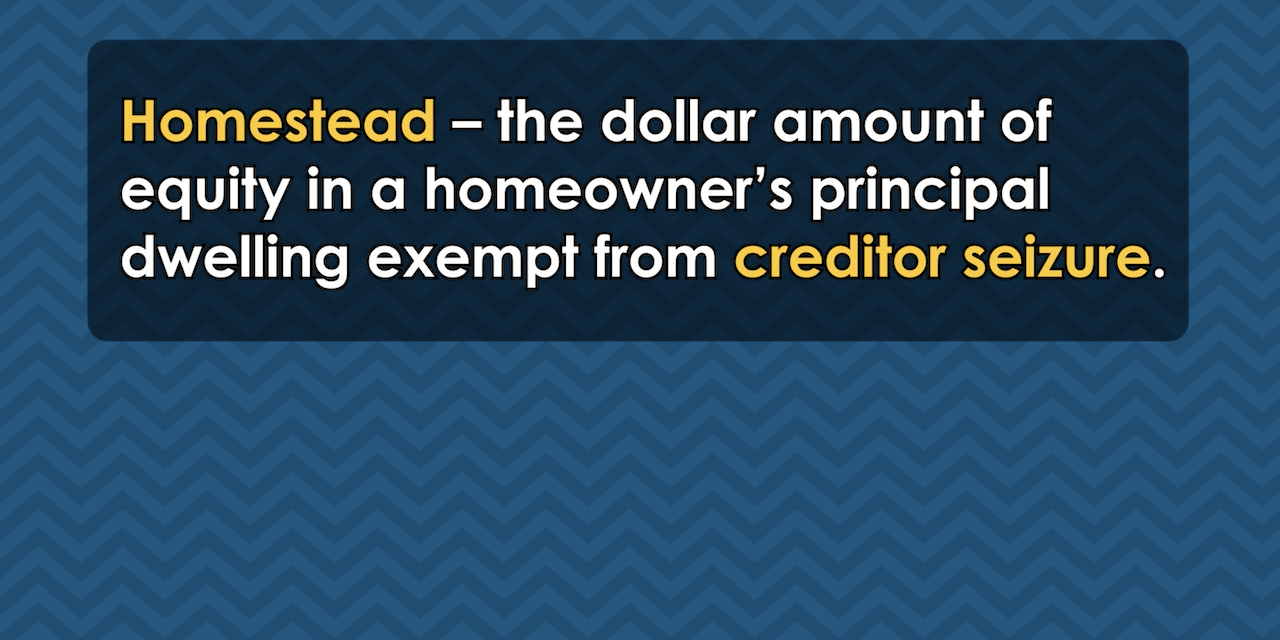What is a homestead?
A homestead is the dollar amount of equity in a homeowner’s dwelling the homeowner qualifies to exempt from creditor seizure. The dollar amount of the homestead held by the homeowner in the equity in their home has priority on title over most judgment liens and some government liens.
Two types of homestead procedures are available to California homeowners:
- the declaration of homestead, which is recorded [Calif. Code of Civil Procedure
704.920; See RPI Form 465]; and - the automatic homestead, also called a statutory homestead exemption, which is not recorded. [CCP §704.720]
Recording yields full benefits
Both homestead arrangements provide the same dollar amount of home-equity protection in California. However, a homeowner needs to record a declaration of homestead to receive all the benefits available under the homestead laws. These benefits allow homeowners the right to sell, receive the net sales proceeds up to the dollar amount of the homestead and reinvest the funds in another home.
Neither the declared nor the automatic homestead interfere with:
- voluntary liens previously or later placed on title to the property by the homeowner, such as trust deeds; and
- involuntary liens given priority to the homestead exemption under public policy legislation; or
- the homeowner’s credit ratings or title conditions.
Some involuntary liens and encumbrances are given priority by statute and are enforced as senior to the amount of the homestead exemption, including:
- mechanic’s (contractor’s) and vendor’s (seller’s) liens;
- homeowners’ association (HOA) assessments;
- judgments for alimony or child support;
- real estate property taxes; and
- Internal Revenue Service (IRS) tax liens.
Involuntary liens that are subordinate and junior to the homestead amount include:
- Franchise Tax Board (FTB) personal income tax liens;
- Medi-Cal liens; and
- judgment creditor’s liens.
Automatic and declared homesteads
An automatic homestead is always available on the principal dwelling occupied by the homeowner or their spouse when:
- a judgment creditor’s abstract is recorded against the homeowner and attaches as a lien on the property; and
- the occupancy by the homeowner continues until a court determines the dwelling is a homestead. [CCP §704.710(c)]
The automatic homestead exemption applies to the equity in:
- a real estate dwelling (and its outbuildings);
- a mobilehome;
- a condominium;
- a planned development;
- a stock cooperative;
- a community apartment project together with the land it rests on; or
- a houseboat or other waterborne vessel used as a dwelling. [CCP §704.710(a)]
Conversely, a recorded declaration of homestead applies only to real estate dwellings. Thus, mobilehomes which are classified as personal property and not established as real estate on the property tax records and houseboats are not protected by a recorded homestead.
To qualify a property for the homestead exemption, the homeowners needs to use the homestead property as the principal residence for themselves and their family.
Amount of equity protected
The dollar amount of home equity protection a homeowner qualifies to preserve is the same under either the automatic homestead or a recorded declaration of homestead.
Homeowners qualify for one of three dollar amounts of net equity homestead protection:
- a $75,000 equity for an individual homeowner with no dependents;
- a $100,000 equity for a head of household; or
- a $175,000 dollar equity for homeowners who are 65 years or older, disabled, or age 55 years or older with an annual income of less than $25,000 or a combined gross annual income of no more than $35,000 if married. [CCP §704.730]
Combating a creditor’s attempt to sell the home
A judgment creditor with a recorded abstract of judgment always needs to first petition a court for authorization to sell a homestead property and collect on a money judgment.
The court then determines whether the owner’s net sales equity in their home is a dollar amount greater than the amount of the owner’s homestead exemption. If so, the creditor may judicially foreclosure on their judgment lien by an execution sale. [CCP §704.740(a)]
However, a home with a net equity less than the homestead amount leaves nothing for the creditor to sell and receive to apply to the debt owed under the judgment.
When the homeowner has not recorded a declaration of homestead on the property, they need to prove their residency in the dwelling qualifies the property for the automatic homestead exemption. [CCP §704.780(a)(1)]
Automatic homestead is a shield
A creditor may be permitted by the court to force the sale of the debtor’s home. However, the court will first exclude the dollar amount of the automatic homestead from the anticipated net sales proceeds to determine if any funds remain to apply on the judgment. If so, the dollar amount of the homestead received by the homeowner on the sale is protected from the creditor’s attachment during a six-month reinvestment period following the sale.
Further, an automatic homestead exemption is provided on the replacement residence to protect the reinvested funds. [CCP §704.720(b)]
However, if the replacement home acquired is in the same county where the judgment lien is recorded, the lien will attach to the new residence (subject to the owner’s homestead exemption) the instant title on the new property is transferred into the homeowner’s name.
A homeowner who voluntarily sells their residence when title is subject to a creditor’s lien cannot use the automatic homestead exemption to protect the sales proceeds from being taken by the judgment creditor.
In contrast, a declaration of homestead recorded prior to the recording of the judgment lien allows the homeowner who voluntarily sells their home to first withdraw their homestead amount from the net sales proceeds before the judgment creditor receives any funds.
Although an insufficient net equity may exist barring the creditor from forcing a sale of the home, the homeowner claiming only an automatic homestead exemption may not use a quiet title action to remove the lien and sell the home, unlike what is accomplished under a declared homestead.
Duration of a recorded homestead
Once recorded, a declaration of homestead lasts until:
- the homestead owner records a declaration of abandonment of the homestead; or
- the homestead owner records a new declaration of homestead on another residence. [CCP §704.980, 704.990]
If a homeowner decides to sell their home which is subject to a declared homestead when title to their home has become clouded with a creditor’s lien, the homeowner may either:
- negotiate a release of the lien with the creditor; or
- clear title to the home through a quiet title action based on the priority of their declaration of homestead.
After title is cleared and the homeowner sells their property, they have six months to reinvest the homestead proceeds in another home. If the proceeds are reinvested in a new residence within six months, the new residence may then be declared a homestead by recording a new homestead declaration.
When the homeowner records a new homestead declaration on their replacement residence, the recording relates back to the time the prior homestead was recorded. [CCP §704.960]
Homestead equity exemption amounts are increased periodically. If the amount changes after the creditor records their abstract of judgment, the amount of exemption, even on the new replacement residence, is the amount that was in effect when the abstract of judgment was recorded, not the later increased amount.
However, if the homeowner does not invest the proceeds of the sale in a new homestead within six months, and the proceeds are still in the State of California, the exempt proceeds from the sale can be attached by the judgment creditor.















Thank you for your article on homestead exemptions. I heard the homestead exemption amounts have recently changed in California. Here is some text i printed when i did a internet search. I do not know if these amounts are correct or not. I do not know if one has to file for the exemption or not. Here is the text i pulled from the internet: “The new California homestead exemption is limited a little by the bankruptcy code. I posted a comment on Facebook a few days ago about people using the new California Homestead Exemption of $300,000 (minimum) up to $600,000 (maximum) depending on the county you live in. The new exemption takes effect January 1, 2021”